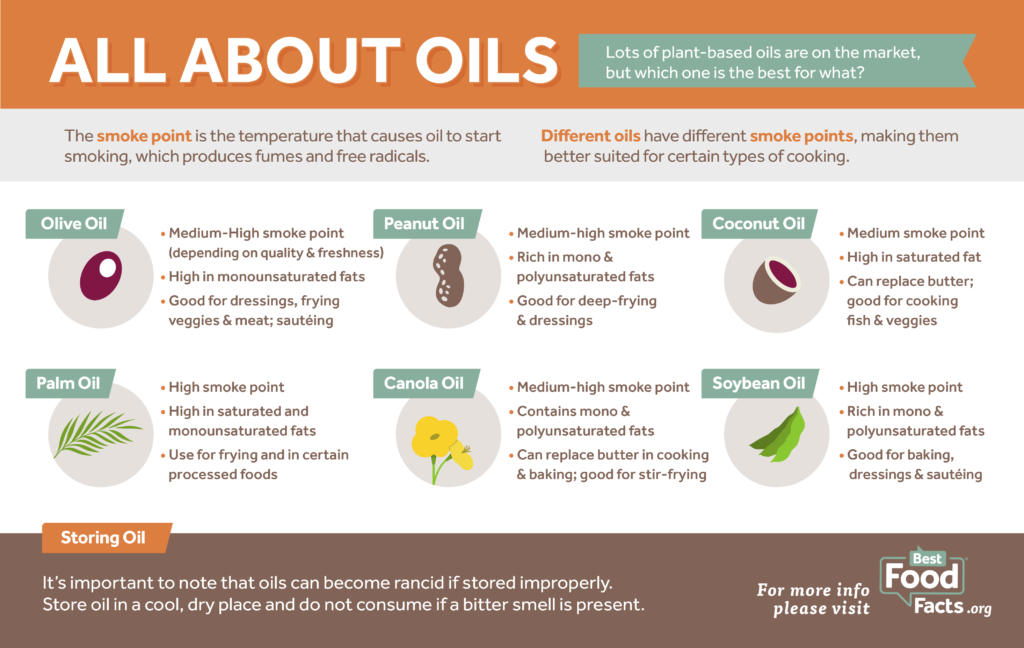
Are Seed Oils Healthy?
Discussion about cooking oils has been simmering, with seed oils becoming a particular focus. These plant-derived oils are common ingredients in many foods, prompting questions about the health impacts. As part of the Best Food Facts series on processed food, we wanted to take a look at seed oils. Nutrition expert Dr. Connie Weaver, distinguished professor of research at San Diego State University, provides science-based answers to common questions and explains how seed oils can be part of a healthy, balanced diet.
What are seed oils and what are they used for?
Dr. Weaver: “Seed oils, often referred to as vegetable oils, are extracted from the seeds of plants, such as soybeans, corn, sunflower and canola, which are derived from rapeseeds. Seed oils are used as a medium for cooking at a higher temperature than water can provide, such as frying, or as an ingredient in foods for texture, flavor, and energy.”
How are seed oils processed?
Dr. Weaver: “Seeds are macerated or ground to enable oil extraction, then purified/refined to remove unwanted flavors and colors. Alkaline processes remove free fatty acids that accelerate rancidity. Degumming removes phospholipids to prevent emulsion formation. Volatile compounds that give undesirable odors are removed.”
Why is all this processing necessary?
Dr. Weaver: “Refining helps extend shelf life, improve palatability, and increase the oil’s smoke point, making it safer for cooking. Without these steps, food products would spoil faster, contributing further to the already significant issue of food waste, which exceeds 30% in the U.S.”
Do seed oils contain toxic compounds?
Dr. Weaver: “Any naturally occurring toxins – as from cottonseed oils – are removed during processing. If the fat becomes oxidized (rancid), compounds that are carcinogenic can form. However, when properly processed and stored, seed oils do not pose a toxicity risk.”
One of the questions that has been raised about seed oils is that they contain linoleic acid, which is a type of omega-6 fatty acid. Omega-6 fatty acids are necessary for humans and are different from omega-3 fatty acids, which are found in foods like fish, nuts and seed oils.
Is linoleic acid or omega-6 fatty acid found in seed oils unhealthy?
Dr. Weaver: “Linoleic acid is an essential omega-6 fatty acid that the body cannot produce on its own. While balance with omega-3 fatty acids is important, current scientific consensus does not support claims that omega-6 fats are harmful when consumed as part of a varied, nutrient-rich diet.”
Rather than focusing on the ratio between omega-6 and omega-3 fatty acids, some experts now emphasize the importance of consuming adequate amounts of both types, as each provides essential health benefits. In fact, a recent study published in the British Journal of Nutrition, “Perspective on the health effects of unsaturated fatty acids and commonly consumed plant oils high in unsaturated fat,” found that higher intake of omega-6 fatty acids is associated with lower risk of cardiovascular disease.
Are beef tallow and other types of fat healthier than seed oils?
Dr. Weaver: “Animal fats like lard and tallow are typically higher in saturated fatty acids than plant sources like seed oils. The Dietary Guidelines for Americans recommend limiting saturated fatty acids to less than 10% of total daily calories. Seed oils, by contrast, contain more unsaturated fats, including heart-healthy polyunsaturated fats.”
Can seed oils be part of a healthy diet?
Dr. Weaver. “Absolutely. We have been recommending shifting from mostly animal sources like lard and beef tallow, as was used in my mother’s generation, to plant-based oils for decades due to their lower saturated fat content. The recent criticism of seed oils stems from their use in empty-calorie foods, but the issue lies with products that are high in fats, sugars and salts, formulation, not the oils themselves. When used appropriately, seed oils contribute beneficial nutrients to the diet.”
What should you look for or avoid in choosing oils for cooking?
Dr. Weaver: “Look for the appropriate oil for the purpose. If it is to be used for frying, for example, look for an oil with a lower smoke point. Olive oil has received much attention as Mediterranean diets which feature olive oil have been associated with reduced risk of chronic disease.”
Seed oils like soybean, corn, and canola play an important role in cooking and food preparation. They provide a plant-based alternative to animal fats, offer important unsaturated fatty acids, and are safe when processed and stored correctly. Research supports their role in a healthy diet when consumed in moderation and as part of an overall balanced eating pattern.



























